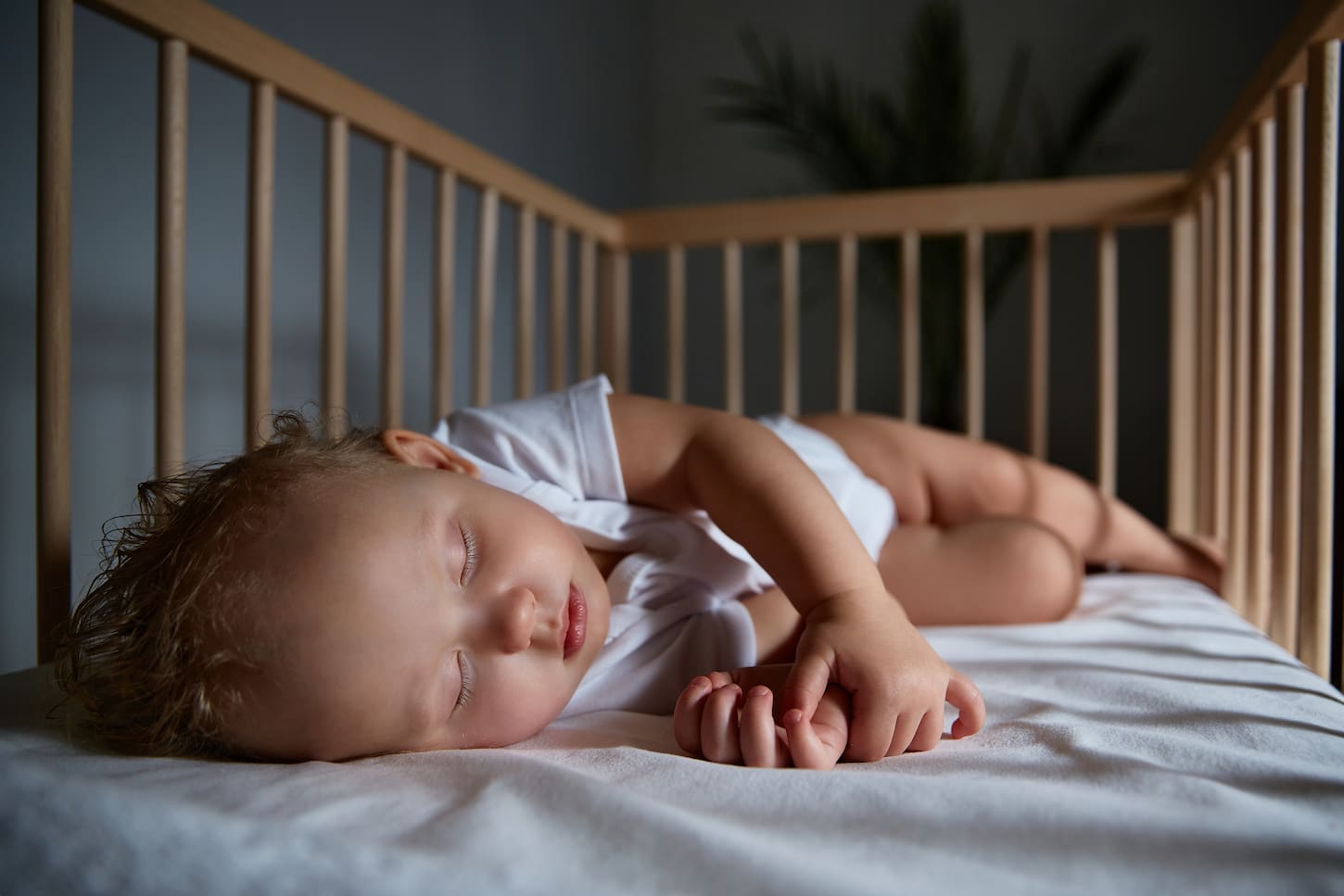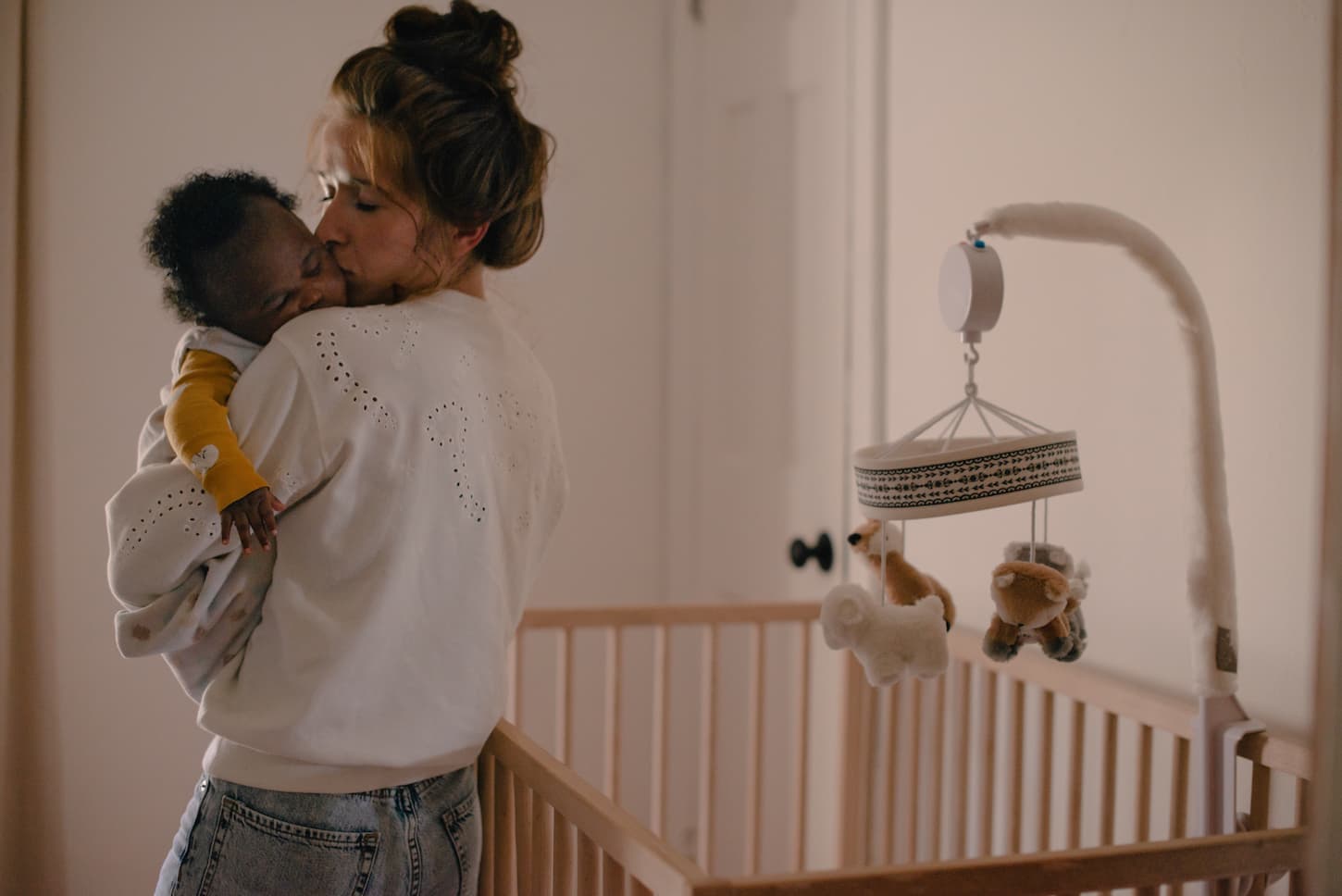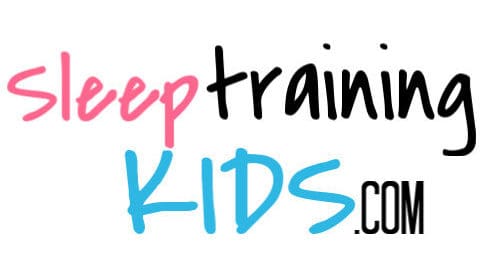As I began to mentally prepare myself for another round of sleep training (this time with child #4), I started wondering what sleep associations my daughter would need to deal with this time.
How are sleep associations and sleep training related? Behavioral-based sleep training is an effective and safe way to break negative sleep associations and create positive sleep associations to help children get a more restful sleep with fewer disruptions.
Since there are three specific kinds of sleep associations (positive, negative, and external), let’s talk about how each interacts with sleep training.

Sleep Training and Sleep Associations
Let’s start with the basics: what are sleep associations? And what is behavioral-based sleep training?
Sleep associations are actions that help us get to sleep (or back to sleep). These may be intentional or subconscious behaviors. Sleep associations may also include sleep props – or items we’ve got to have on hand so that we can sleep more peacefully.
Behavioral-based sleep training is a technique to help a child learn to self-soothe themselves to sleep more effectively and easily. Behavioral sleep training focuses on making incremental changes so that neither the parent nor the child suffers any severe or lasting distress from the experience.
Now, an important note: sleep training and sleep associations should only be considered once your baby is at least 4 months of age. Before a baby is 4 months old, their brain hasn’t matured enough for either sleep associations or sleep training to work properly.
Before a baby’s brain has reached this four-month developmental milestone, babies have a much harder time learning to self-soothe. Before 4 months of age, swaddling, soothing, swinging, and babywearing may be your best bet for helping your baby sleep.
Once your baby’s brain has matured, though, they’ll be able to learn how to use sleep training to develop positive sleep associations and get better sleep.
As for sleep associations, there are three main types:
- Positive sleep associations (self-soothing behaviors)
- Negative sleep associations
- External sleep associations (or sleep props)
In this instance, “positive” and “negative” don’t just mean desirable and undesirable; they also refer to who is doing the behavior.
So for a positive sleep association, it’s one that the baby can do for themselves. Negative sleep associations, on the other hand, are behaviors that you rely on others to provide. That’s why they can become such a crutch – because if the other person isn’t there to help, it’s not going to work.
How, then, do we know when to go from not worrying about things for our less-than-4-month-old to our 4-month-old baby?
Well, don’t worry about it unless it becomes a problem.
Many babies can “sleep train” on their own and don’t need any guidance whatsoever. These babies can quickly transition from their cat-nap style of sleeping into more adult-like sleeping patterns with minimal disruptions.
But for those of us whose kids weren’t able to make that transition on our own, sleep training is the best way to help everyone. Behavioral sleep training not only teaches the babies how to self-soothe; it also teaches the parents to quit providing negative sleep associations that are making the situation worse.
I used to worry that it was my actions (via the negative sleep associations) that caused my children to be bad sleepers. But in fact, a 2008 study shows the opposite to be true:
Findings support the hypothesis that maladaptive parental behaviors develop in reaction to preexisting sleep difficulties.
Longitudinal Study of Preschool Sleep Disturbance, Pediatric Adolesc Med Apr 2008
In other words, it’s normal for parents to fall back on what used to work. It’s the lack of sleep and an attempt to help that’s causing these maladaptive (inappropriate) parenting behaviors to manifest. It’s not a parenting fail; it’s relying on what used to work, but it’s just not working anymore.
For example, my children as newborns required being swaddled and rocked to get them to sleep. But at 5-6 months of age, as that same baby hit a sleep regression, I naturally fell back on behaviors that used to work. We needed behavioral sleep training because it helped us learn a better way to do things – opening up the way for the baby to learn how to self-soothe and get back to sleep.
So let’s talk about how each sleep association relates to sleep training in more detail.
The Effects of Sleep Training on Positive Sleep Associations
Sleep training done right and positive sleep associations go hand-in-hand. One helps cause the other in a positive feedback loop.
Here are some examples of positive sleep associations:
- Curling up or doing leg lifts to get into a fetal position
- Rocking back and forth
- Shifting positions
- Sucking on a finger, thumb, or pacifier
- Banging feet, arms, or head against the mattress (or crib)
- Singing, humming, and babbling
Once a baby learns to self-soothe via these positive sleep associations, they’re going to be able to fall asleep faster, easier, and get better overall sleep. Why? Because nighttime disruptions that used to wake them will become no big deal – they’ll be able to get back to sleep!
Example: Our oldest boy, while sleep training, cried for a short period after being put to bed. However, he soon settled down to roll around in his crib and bang his arms and feet down as hard as he could. After several nights of a consistent sleep training routine, he became a much better sleeper.
Negative Sleep Associations and Sleep Training
Negative sleep associations aren’t bad behaviors; they’re crutches we’ve learned to rely on to help us fall asleep. But because they’re done by someone else, they’re problematic for several reasons.
The first is that they’re disruptive to sleep. They may help a baby fall asleep initially, but it’s at the cost of deep sleep. Many babies who rely on negative sleep associations to fall asleep wake up after a short 20-minute interval.
Here are a few common negative sleep associations:
- Swaddling
- Touching the baby while they fall asleep
- Being rocked, bounced, or lulled to sleep
- Being nursed or bottle-fed to sleep
Sleep training, then, involves the removal of these crutches. Ideally, we aren’t replacing one crutch with another. Instead, we’re using this time to introduce positive sleep associations so that we can all learn to sleep better.
Example: my daughter and I coslept until she was about 7 months old. At that age, she began to sleep less soundly and restfully, so we recognized that cosleeping was a negative sleep association. We used gradual sleep training to transition her from cosleeping to sleeping alone in a crib. Within a few months, she was able to fall asleep on her own without any issues – and we all got better quality sleep.
Using External Sleep Associations During Sleep Training
External sleep associations aren’t behavior; they’re environmental cues or triggers that can help our brains prepare for sleep. Because anyone can set them up, they’re in their category.
Common examples of external sleep associations are:
- Using a white noise machine to mask disruptive noises
- Blackout curtains to keep a room dark
- Use a fan to keep the room at a cool, comfortable temperature
- Using a blankie, stuffed animal, pacifier, or another prop to promote self-soothing
That being said, there’s an important warning about external sleep associations: while they can be a positive sleep association, they can quickly become a negative one if the child can’t find their blankie, can’t put the binky back in their mouth, or their soothie gets lost.
So as you’re sleep training, the ideal is always to remove as many external sleep associations as possible. That being said, if the external sleep association remains neutral or positive, it’s not a problem that needs to be addressed.
It’s only once it’s become a negative sleep association (or a problem) that it needs to be addressed with sleep training.
Example: Our children relied on binkies (pacifiers) for self-soothing. We taught them how to put them in as soon as we could. At night, we used a short binky tether so that a sleepy baby could find their binky easier. To us, the positive sleep association outweighed the negatives. We did not want to remove this external sleep prop until our child was ready.
Now, we talked with both our pediatrician and our pediatric dentist to make sure everyone was on board with us continuing to use a pacifier until our child was 2 years old. And, both were fine with it. At two, each of our children “graduated” from their pacifier and transitioned just fine.
So now let’s talk about how you can break sleep associations during sleep training.
How to Break Sleep Associations During Sleep Training
Sleep training is a great time to break negative sleep associations – and replace them with positive ones. That being said, I’ve noticed that it’s easier for everyone involved if you have a detailed plan first.
For example, our first sleep training attempt with our oldest son didn’t go great. We also didn’t have much of a plan. However, we learned from our mistake and our next attempt went better.
What kinds of plans should you have in place? Most people opt to follow an outlined sleep training plan from a book or an online template. These general guidelines are a great way to help you sleep train and break negative sleep associations.
But as you’re sleep training, it will be much easier to see success if you know beforehand which sleep associations need to be addressed, and if they need to be addressed one by one or all together.
When we began sleep training our daughter, I was cosleeping with her, she had both a blankie and a binky, and she required rocking to get to sleep. I knew that I wouldn’t be able to remove all of those negative sleep associations at one time, though, because it didn’t work for her brothers.
So we set out a gradual plan to remove one sleep crutch at a time – while also focusing our sleep training on creating a positive bedtime routine to get things rolling.
Over time, we stopped rocking her to sleep, quit cosleeping, and she began sleeping alone in her crib. Now? She’s a great sleeper – just like her brothers.
Some kids may be able to make the transition much faster. Having a detailed plan will help you stick to a plan, track its success, and make changes as needed. That way, you’ll be able to manage sleep training with ease so that everyone sleeps better.
How Do I Break the Nursing Sleep Association?
The first thing to do when you’re wanting to break the nursing sleep association is to decide why that is. If nighttime feedings are still necessary for your child’s growth and development, then it’s a moot point because they still have to happen.
However, if they are not necessary and they have become a problem, then nursing has become a negative sleep association that needs to be addressed.
This can be done gradually or all at once, using the same principles learned in the behavioral sleep training method of your choice.
For example, up until 12 months old, my children still needed nighttime feeds to reach their daily caloric needs. So until their first birthday, they could nurse at night. After that, though, my husband responded to the babies at night for about a week. Our babies quickly adjusted and no longer relied on this particular negative sleep association.
Sleep training while nursing is a huge topic – and it’s one that I intend to cover in more depth in the future.
Sleep training and dealing with sleep associations don’t have to be hard. They can be as easy and gradual or focused as you need them to be. Just remember that it’s a process that’s changing habits – and it’s going to take time for everyone to adjust.
Hang in there – and best of luck.

Related Questions
When Should You Start Sleep Training? You can start formal sleep training once a child is at least 4-6 months of age. Sleep training isn’t necessary for every child.
How Do You Sleep Train Without Crying It Out? You can sleep train without crying it out by using behavioral-based sleep training methods that are safer and far more effective.
What Are The Best Baby Sleep Training Methods? The best and safest sleep training methods use behavioral training that focuses on gradual adjustments rather than immediate results.
